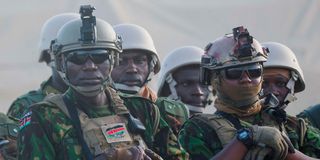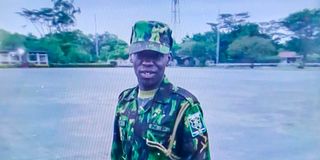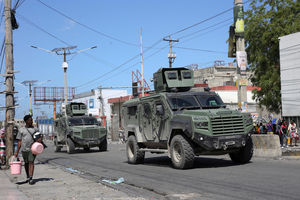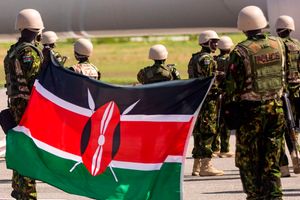
Members of the first contingent of Kenyan police stand in formation after arriving in the Caribbean country as part of a peacekeeping mission, in Port-au-Prince, Haiti June 26, 2024.
The first contingent of 400 Kenyan police officers fighting gangs in Haiti is expected back in June after completion of one year.
According to Mr Jack Ombaka, the spokesperson of the Multinational Security Support (MSS) Mission, the police officers who were deployed to Haiti on June 25, 2024, signed a one-year contract.
“The officers have signed a one-year contract and that means those who left on June 25 will be returning home soon,” said Mr Ombaka.
Another group of 600 police officers were deployed last October. The third contingent of 217 Kenyan police officers arrived at Port-au-Prince Airport in Haiti on January 18.
At the time, the National Police Service announced the next batch of the remaining 400 officers were to join the Haiti team “in due time.” The MSS Mission is under the leadership of Mr Godfrey Otunge.
Kenya has had two casualties while leading the international policing mission that was authorized by the UN security Council.
Mr Samuel Tompoi who was killed during an attack by gangs has since been buried in Kenya.
The Haitian government also mourned Benedict Kabiru following an ambush by gangs.

A picture of Benedict Kabiru Kuria, a police officer who went missing in Haiti.
But the Kenyan Government has not officially acknowledged his death, instead categorising him as missing.
Mr Ombaka told Nation that the search for the officer is still ongoing.
“The search for the officer is still ongoing and we shall keep the public posted on every move that is being made,” he said.
Dead or alive, Kabiru is believed to be in the hands of the Gran Grif gang. It is the gang that recently shared a video of the captured Kenyan police officer.
The gang is responsible for the December deaths of over 110 people- the highest number of casualties since Kenya deployed police officers in the war-torn Caribbean nation.
It is led by a notorious leader Monel “Micanord” Felix alias Micanord “Wa Mikanò” Altès.
The Gran Grif gang is part of the Viv Ansanm coalition, meaning "Living Together" in Creole, which is led by dreaded gang leader Jimmy Cherizier alias Barbecue.

Former police officer Jimmy "Barbecue" Cherizier, leader of the 'G9' gang alliance, flanked by fellow gang members in Port-au-Prince on March 5, 2024.
It was formed just weeks before the first contingent of Kenyan police officers arrived in Haiti.
Other gangs within Viv Ansanm include G9 alliance, Delmas 6 Gang which is considered one of the oldest. It was formed even before Barbecue left the Haiti National Police (HNP). The other gangs are Baz Pilate which consists of ex-SWAT officers, Baz Krache Dife, Grand Ravine, Baz Galil, Titanyen gang, Base 5 Secondes, Canaan gang, 400 Mawozo, Nan Brooklyn gang and G-Pep.
According to the MSS spokesperson, the mission still faces challenges of personnel and equipment.
“Even though the intended target of personnel that are supposed to be deployed has not been achieved, gradual decisive operations being undertaken have yielded fruits,” he said.
President Ruto has in the past raised similar concerns asking the international community to fulfill the promises they made ahead of the deployment of Kenyan officers.
“We are asking the international community to match their commitment, their pledges with the necessary action for us to be able to complete the task ahead of us,” President Ruto said in October 2024.

Members of the Kenyan National Police Service hold a Kenyan flag after disembarking in Port-au-Prince, Haiti June 25, 2024.
Asked about complaints over delays in paying salaries of officers, Mr Ombaka responded there have been “glitches between New York and Nairobi.”
There have also been concerns about the quality and quantity of Armored Personnel Carriers (APC) that MSS officers are using.
“In view of these challenges, the International community must step up their pledges and support to the MSS mission and the Haitian government, if Haiti is to go back to normalcy,” he said.
Since June, last year, the officers under the MSS mission working alongside the Haiti National Police (HNP) have thwarted attacks at police stations like Savien Police Station in Pont Sonde, and Petionville neighborhoods.
Mr Ombaka said the collaborations between MSS and HNP has helped flush out gangs and reopen major roads.
MSS has introduced Forward Operating Bases (FOBs) which are military bases that are based in four areas- Pont Sonde, Downtown, and Police Academy and the IGPNH.

Kenyan police officers stand holding the national flag after landing to reinforce a security mission to tackle violence in Haiti, in Port-au-Prince, Haiti February 6, 2025.
“Once an FOB is set up, MSS officers are based there alongside the Haiti police officers. This has seen a significant impact in addressing insecurity in the respective areas,” Mr Ombaka said.
He said that MSS being a purely police-led mission had identified four working phases - deployment, decisive operations, stabilization, and transition phase.
Apart from Kenya and Haiti, other countries forming part of the MSS are Jamaica, Guatemala, Bahamas, El Salvador and Belize.







